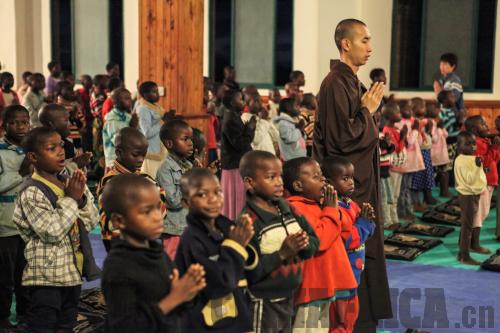|
 |
|
Prayer Time:Orphans at Malawi's ACC follow Buddhist traditions of praying, eating vegetarian food and practicing kungfu (PHOTO BY JORDI MATAS) |
It is late afternoon. The sun is throwing shades of pink onto every protruding silhouette, from empty bottles to the spoked wheels of bicycles passing by. The dusty road from Blantyre to Limbe in Malawi is lined with dilapidated shacks, colorful spaza (convenience) shops, noisy shebeens (bars) and second-hand electronics stands. Street vendors anxiously scamper around, trying to make a final sale for the day.
Immersion in this chaotic performance is abruptly ceased with a sharp turn-off to the right. From here on forward, the road becomes more and more rutted as it ascends into the hills. Oblivious of the secret that lies hidden on top of the emerging plateau, astonishment awaits when, beyond its edge, one is suddenly transferred all the way from Southern Africa to Asia.
The overpowering ring of a bell, the echo of children chanting sutras, a colossal Buddhist temple towering over the rolling hills and monks scurrying around in perfect posture, dressed in lengthy grey and brown robes, stimulate the senses. This is the Amitofo Care Center (ACC), a philanthropic home that crosses cultures and shares compassion in one of the world's poorest countries.
Firm foundation
When Lucy Tikitha was nine years old, she was taken from her village in Phalombe in southern Malawi and brought to the ACC, situated in the outskirts of Blantyre, Malawi's financial capital. Tikitha recently turned 16. She now speaks fluent Mandarin, performs kungfu at an international level, attends Buddhist teachings every morning at 5, practices meditation and follows a strict vegetarian diet. Tikitha lives in a dorm with 19 other Malawian girls, some of whom are less than three years old.
The ACC in Malawi is comprised of an administration center, 16 dormitories, a preparatory school, a kindergarten, a library, an activity center, a medical center, a vocational training center and a religious center, occupied by 265 orphans like Tikitha.
Centers can also be found across the continent in South Africa, Swaziland, Burkina Faso, Chad, Gambia, Sao Tome and Principe, Nigeria, Zambia, Zimbabwe and Cameroon.
Tikitha is happy at the ACC. It has become her second home. Here, she has the chance to learn things that back at her village would never have been possible. In her village, girls get pregnant as early as 14 and were Tikitha still there, she might have had a child of her own by now.
According to World Health Organization 2009 statistics, 11 percent of Malawians aged 15-49 have HIV. Tikitha, like most of the other Malawian children here, was taken in by the ACC because her relatives are living with HIV and could no longer take care of her.
When Venerable Hui Li, the ACC founder, made his first visit to Malawi in 1998, he noticed the high percentage of Malawians living with HIV and realized that this would result in a significant portion of Malawi's next generation left parentless and uneducated. The ACC was started in 2002 with only 20 orphans. It now hosts more than 265 orphans and is managed by 19 Asian employees, 10 of whom are Chinese, as well as 89 Malawians.
Children at the center not only are taken care of, but also receive schooling. They follow the Malawi educational curriculum in all classes, with the exception of syllabuses followed in Buddhist dharma and Mandarin lessons. Besides Mandarin, children also study English and Chichewa, the local Malawi language, guaranteeing their fluency in all three languages by the age of 16. Tikitha and several other orphans were also lucky enough to be granted scholarships with which to further their studies at an Asian university of their choice. Tikitha would like to study nursing in Hong Kong, but hopes that one day she will be able to return to Malawi to live and work.
|